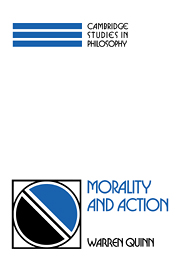Book contents
- Frontmatter
- Contents
- Acknowledgments
- Introduction
- 1 Moral and other realisms: Some initial difficulties
- 2 Abortion: Identity and loss
- 3 The right to threaten and the right to punish
- 4 Reply to Brook
- 5 Truth and explanation in ethics
- 6 Reflection and the loss of moral knowledge: Williams on objectivity
- 7 Actions, intentions, and consequences: The Doctrine of Doing and Allowing
- 8 Actions, intentions, and consequences: The Doctrine of Double Effect
- 9 Reply to Boyle's “Who is entitled to Double Effect?”
- 10 The puzzle of the self-torturer
- 11 Rationality and the human good
- 12 Putting rationality in its place
3 - The right to threaten and the right to punish
Published online by Cambridge University Press: 05 June 2012
- Frontmatter
- Contents
- Acknowledgments
- Introduction
- 1 Moral and other realisms: Some initial difficulties
- 2 Abortion: Identity and loss
- 3 The right to threaten and the right to punish
- 4 Reply to Brook
- 5 Truth and explanation in ethics
- 6 Reflection and the loss of moral knowledge: Williams on objectivity
- 7 Actions, intentions, and consequences: The Doctrine of Doing and Allowing
- 8 Actions, intentions, and consequences: The Doctrine of Double Effect
- 9 Reply to Boyle's “Who is entitled to Double Effect?”
- 10 The puzzle of the self-torturer
- 11 Rationality and the human good
- 12 Putting rationality in its place
Summary
Most of us feel certain that punishment is, in many cases, fully justified. But as to the nature of the justification we are perplexed and uncertain. I do not refer here to punishment within the family. Parents are natural educators morally charged with the task of turning their young dependents into civilized adults, and they need, common sense insists, the possibility of punishing to succeed. But civic punishment, in which one adult is made to suffer for his past wrongdoing by other adults who officially represent the community, raises different problems. It is not, of course, that we doubt its utility. Common sense urges, no less here than in the case of family discipline, that some form of civic punishment is necessary for a decent social order. The difficulty lies rather in the question of authority or right. For on the modern liberal view, adult criminals are not dependents of the community, and the community is not assigned the moral task of forming or improving their characters. How then does its right to punish them arise?
The major source of theoretical difficulty here is the fact that the restrictions, confinements, and deprivations of property and life that make up standard civic punishments would, if imposed in nonpenal contexts, be opposed by various important moral rights of liberty, life, and property. If these evils did not come by way of just punishment, a person subjected to them could object to his treatment in ways that would have serious moral weight.
- Type
- Chapter
- Information
- Morality and Action , pp. 52 - 100Publisher: Cambridge University PressPrint publication year: 1994
- 1
- Cited by

